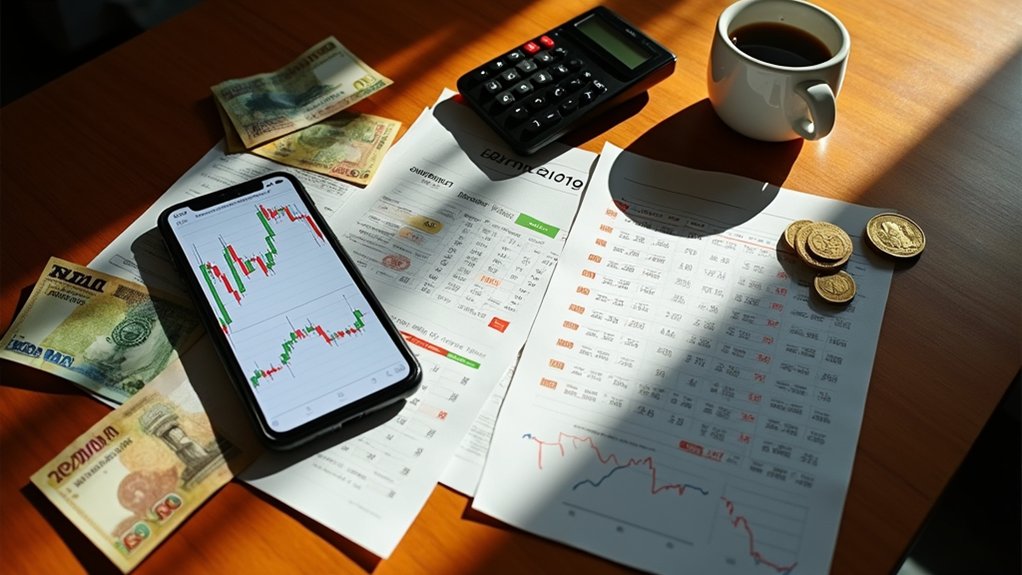GDP reports trigger violent swings when they miss forecasts, dragging currencies up or down as traders reassess growth. Inflation data—especially CPI—signals whether central banks will hike or cut rates, moving exchange rates accordingly. Interest rate decisions themselves cause convulsions, since higher rates attract foreign cash and lift currency values. Employment figures matter too, though they're shakier in emerging markets. Trade balances reveal whether a country exports more than it imports, driving demand for its currency. The mechanics behind these moves reveal why certain releases spark panic while others barely register.

Across Africa's trading floors—from Lagos to Nairobi, Cairo to Johannesburg—economic indicators don't just move markets. They shake them. Hard. And traders who ignore these releases? They get burned. Fast.
Gross Domestic Product sits at the top of the pile. When quarterly GDP numbers drop, currency pairs tied to that economy swing violently. A strong GDP reading out of Egypt or Kenya typically lifts the pound or shilling. Weak numbers? The opposite happens, and it's ugly. Markets don't just look at the headline figure either. Components matter. Consumption data, investment flows—all of it gets dissected. Strong GDP growth often triggers expectations that central banks will tighten policy, which supports currency values. When economic growth accelerates, forex traders anticipate stronger currency valuations as investor confidence builds. Miss that connection and you're trading blind. GDP measures the total economic output of goods and services produced within a country's borders over a specific period.
Strong GDP numbers trigger currency rallies. Weak readings? Markets punish fast. Miss the central bank connection and you're toast.
Then there's the Consumer Price Index. Inflation data. This one's critical across African economies where inflation volatility is real and frequent. High CPI readings signal that central banks might hike rates to cool things down, and that prospect usually strengthens the currency. Low CPI? Expect rate cut speculation and a softer currency. When Nigeria's CPI jumps or South Africa's inflation overshoots, the naira and rand react immediately. Persistent inflation above target erodes purchasing power and hammers exchange rates over time. Inflationary pressures directly influence central bank monetary policy decisions, creating ripple effects throughout currency markets. It's not complicated, but it's brutal.
Central bank interest rate decisions are the heavyweight events. The South African Reserve Bank, Central Bank of Egypt, Bank of Ghana—when they shift rates or even hint at future moves, forex markets convulse. Higher rates attract foreign capital and lift currency values. Lower rates do the reverse. Rate differentials between countries drive massive flows. A trader in Accra watching the Fed and the Bank of Ghana simultaneously isn't being paranoid. They're being smart. Understanding how interest rate changes influence exchange rates is fundamental to predicting currency pair movements.
Labor market data matters too, though it's less reliable or timely in many African markets compared to Western releases. Still, when available, positive employment figures boost confidence in a currency. Weak jobs data? It signals trouble ahead. Wage growth gets attention as an inflation signal. Strong NFP numbers typically strengthen USD pairs sharply, which has direct knock-on effects for African currencies pegged or trading heavily against the dollar.
Trade balance and current account data reveal whether a country exports more than it imports. Surplus nations see currency demand rise. Deficit nations? Pressure builds. For commodity exporters like Angola or Zambia, these releases are especially volatile, swinging with global prices. Persistent deficits drive up domestic debt levels and often lead to currency devaluation as markets lose confidence.
Retail sales and consumer confidence round out the list. Strong consumer spending hints at GDP growth. Slumping retail figures warn of contraction. And across Africa, where consumer economies are expanding rapidly, these indicators carry weight. Ignore them at your own risk.
Common Questions
How Do Power Outages in Nigeria Affect My Ability to Trade Economic News Releases?
Power outages hit Nigerian traders hard during news releases—the worst possible timing.
Grid collapses strike unpredictably, cutting internet and equipment mid-trade.
Generators help, but fuel costs drain profits and supply chains fail.
Hardware gets fried by voltage swings.
Result? Missed opportunities, slippage, and forced exits while traders in stable countries execute freely.
Nigeria loses 5.2% GDP annually to outages, and traders feel every naira of it.
Remote traders and small operations get hit hardest when the lights die.
Which African Central Banks Publish Economic Data Calendars Accessible to Local Retail Traders?
Most African central banks don't publish retail-friendly calendars.
South African Reserve Bank, Central Bank of Nigeria, Bank of Ghana, Bank of Botswana, and Central Bank of Kenya release policy dates and stats, but traders actually rely on third parties.
Trading Economics, FXCM South Africa, IFCM, AvaTrade (Official Site 🔗), FXStreet, and Investing.com build the calendars African traders use daily.
They pull official data, add filters, color-code impact levels.
Central banks provide raw material; platforms make it tradeable.
Can I Trade the Kenyan Shilling or Ghanaian Cedi With African-Regulated Brokers?
No. African-regulated brokers—whether under South Africa's FSCA, Kenya's CMA, or Ghana's SEC—don't offer KES or GHS as tradable pairs on retail platforms.
Liquidity is terrible, infrastructure doesn't exist, and regulators actively discourage local currency speculation.
ZAR gets love from South African brokers, but that's it.
KES and GHS exposure? That's OTC territory through commercial banks, not your standard MT4 account.
International brokers *might* list them as exotics, but they're not African-regulated.
Do South African Economic Indicators Impact Other African Currencies Beyond the Rand?
Yes, absolutely. South Africa's economy is the continent's heavyweight, so its data ripples outward. When the South African Reserve Bank shifts rates or inflation trends move, neighboring currencies—especially in Lesotho, Eswatini, Namibia—feel it fast.
Gold price swings that jolt the rand? Ghana and Mali see echoes. Trade flows, remittances, and investor mood all link back to Johannesburg.
South Africa sneezes, and currencies from Botswana to Zambia catch a cold. Regional integration means spillover is real.
How Reliable Are Economic Data Releases From Countries Like Zimbabwe or Sudan?
Economic data from Zimbabwe and Sudan? Let's be honest—it's messy. Zimbabwe's stats are often delayed or contradictory, with official numbers clashing against black market realities. Sudan's data infrastructure got wrecked by years of conflict and sanctions.
Both countries struggle with outdated collection methods and political interference. The IMF steps in to verify what it can, but traders still face huge gaps. Many African forex participants cross-reference multiple sources or just trade around these currencies entirely. Trust is earned, not given.










